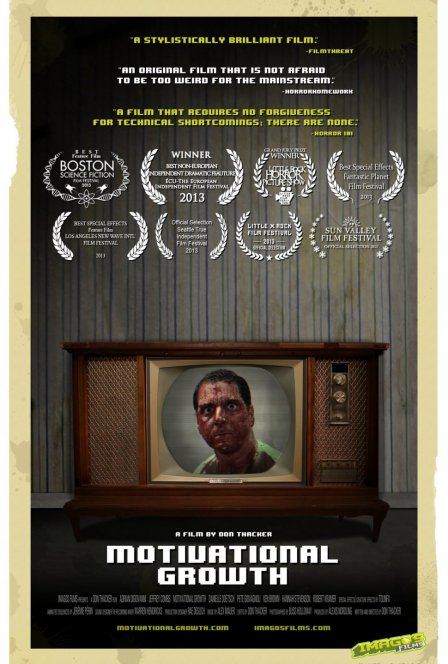In Japan, there is an entire subsect of the population that are recluses — never leaving their apartments and rarely interacting with the outside world. Roughly 700,000 Japanese people belong to this group, known as hikikomori — literally defined as “pulling inward, being confined” — and it is such a prevalent problem that national studies are conducted to debate causes and plan out a treatment to avoid the catastrophic problems that millions of agoraphobics with no discernible income will have on a society. What happens when you become trapped not just by the walls of your home, but by the very confines of your mind? A prison within a prison, where are you able to retreat when it’s not only the outside world that frightens and disturbs you, but also the inner part of your brain that you no longer trust? Motivational Growth takes viewers on an epic journey without ever stepping out of an apartment, telling a unique and insane story about a man shackled by his fears, his insecurities, and a malevolent piece of talking mold.
Ian (Adrian DiGiovanni) has not left his house for over sixteen months, his days spent watching mindless crap on his vintage television set, pooping, and obtaining various stains, sores, and spores around his apartment. After his TV dies, Ian seeks to follow suit — but instead finds himself conversing with The Mold (Jeffrey Combs), a fast-talking piece of fungus with a predilection ’50s jargon and a master plan to solve all of Ian’s problems. But what begins as promising, positive change soon devolves into possible murder and hallucinations as Ian finds himself in yet another prison. Motivational Growth is an exhilarating and imaginative film that careens from one weird moment to the next, held together by excellent imagery and an engaging performance by Adrian DiGiovanni as Ian. The film expertly explores the soul-crushing dread of losing control and possibly one’s mind, but with a lot more blood, slime, and Game Genie parodies than you’d expect.
Write and director Don Thacker has brought together many disparate elements of horror, sci-fi, comedy, and just out-and-out weirdness to craft a singular piece. An 8-bit score surges along in the background as Ian encounters various interlopers in his apartment, each a wholly realized character despite only appearing on screen for a few minutes and delivering dialogue reminiscent of David Lynch at his most oddball. The film smash cuts between various parodies of workout programs, 16-bit video games, and a drama with a space cop marooned on Earth, before coming back to Ian slowly devolving in his apartment. There’s never an attempt at providing a solution as to what’s happening: is it all really occurring, is this a dream, did Ian succeed in his suicide attempts, perhaps this is all some DMZ induced trip? But the lack of a definitive answer is perfectly in keeping with the rest of the uneasy movie that goes from laughs, to disgust, to slight pity for Ian, the lonesome man lost at the center of this chaos.
Ian is literally in every minute of this film, with many of his lines spoken directly to the camera, and DiGiovanni successfully plays the character as someone who is grotesque in his slovenly ways, pitiful in his obvious fears, but also charismatic in his weirdly witty way. Jeffrey Combs provides the voice for The Mold, appearing on screen as a pretty impressive puppet that is equal parts cute and hideous, and develops a real patter as the man (er, fungus) with the plan who can help Ian, so long as Ian helps The Mold. All of this occurs within the confines of the apartment and/or Ian’s mind, and it’s to the filmmakers’ credit that at one moment it seems like this apartment can encompass the whole world, while in the next scene the viewer feels painfully claustrophobic by the walls pressing in.
Hikikomori are occasionally referred to as a “lost generation” for Japan, as they are not contributing to society but instead merely sustaining off their families’ charity. Motivational Growth ponders what else can be lost when you don’t engage with the world. Ian’s fears grew so insurmountable that he withdrew from the world to hide from them, and yet they took seed and are now growing in the last piece of refuge he thought he has left. For some, it’s easy to shut out the world, close your eyes, and hope everything will just go away. But life tends to not like being ignored. There is at least one good reason to get out of the house once in a while, though: to seek out bold, original films like Motivational Growth.

